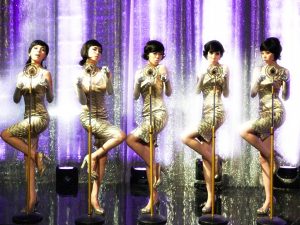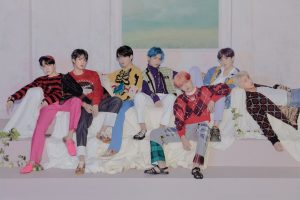
From 2008 to 2009, we saw three major Korean artists, each representing one of the Big Three companies, attempting to advance into the American market. From SM Entertainment, BoA debuted with “Eat You Up” and released BoA, her only English language album. This was later followed up singles “Energetic,” “Look Who’s Talking,” and “I Did It For Love.” From YG Entertainment, we saw Se7en attempt his own American advancement beginning with “Girls” featuring Lil Kim. Finally, from JYP Entertainment, we had the Wonder Girls, who began their American advancement with an English version of “Nobody” and continued international activities until 2010.
In the intervening years, there have been some other attempts, an example being SNSD releasing an English version of “The Boys.” But for the past year or two, American advancement has taken a different amount of zeal and coverage.
We are now knees deep into American Advancement 2: Electric Boogaloo. BTS’ success has been covered plenty, and the much anticipated SuperM debuted this month. This month, we ask the writers: what differentiates the current attempts at American advancement from before? What other groups would you like to see attempt an American advancement? Finally, what are the downsides of American advancement?

Gaya: K-pop has definitely learned from experience; instead of trying to release an album on their own as with BoA, SM has instead found a Stateside label, Capital Records, that is willing to bankroll their efforts. Of course, US labels and their artists are currently much more receptive to taking on K-pop talent, which would lead to more collaborative success: we’ve come a long way from the apathy of “Ayyy Girl.”
Western players are paying attention to the numbers K-pop acts can pull from their devoted fanbases and they can almost taste the dollars. I am still waiting for the inevitable surprised Pikachu moment when Western music starts churning out some K-pop-style acts of their own. The current surge of diverse casting can spread to music and help K-pop groups–hopefully not at the expense of diasporic Asian artists, though it doesn’t seem to be going badly so far. But I can also see the US being OK with a few select groups being novelties, but resisting any greater number of K-pop acts trying to crack the market.

That being said, I would like to see more girl groups. I NEED more girl groups. Right now it’s just Black Pink, but they need more music and some friendly competition could get Universal to do something. Twice and Red Velvet are the obvious options, the latter more so than the former, but I would also love me some IU, Ha:tfelt, Loona, and Brown Eyed Girls. This would be a perfect opportunity for free agent Ailee to mount a US debut — Aileean who???
Qing: We’ve seen a gradual shift towards K-pop being treated as a novelty towards idols being taken more seriously as artists. I think it was really with Psy‘s viral “Gangnam Style” in 2012 that the American media began to sense the potential reach of K-pop. Psy was treated with a mix of fascination and scorn, but those who cared to look closely enough noticed the socio-cultural commentary hidden beneath the wacky kitsch of the release.
Fast forward a couple of years, and we begin to see some incredible collaborations between K-pop artists and not just American, but also European, artists and producers. It still baffles me that Giorgio Moroder, pioneer of disco and EDM, wrote the restrained yet dramatic “One More Day” for Sistar. The following year, BTS’ RM and Wale‘s “Change” created a confluence between social issues close to both artists’ hearts. More recently, Monsta X‘s collaboration with French Montana, “Who Do You Love”, a sensual, pulsing R&B-influenced track, showcased vocal colours we haven’t heard from them before. These instances highlight the wins in artistic growth that American advancements bring to K-pop groups.

On the flip side, K-pop artists need to be careful about how much time and effort they invest in the American music market. Achievements in the US boost sales and Korean media coverage and brand recognition. However, the long-term careers of K-pop groups ultimately lie in the domestic, East-Asian, and Southeast Asian markets. Pandering to assumed tastes of the American mainstream audience can have an adverse impact on K-pop artists’ musical styles and domestic reception to their music. We also see groups like BTS cutting Korean promotional periods short to accommodate their activities in the US. Only time will tell how this will affect their long-term career, but it’s not a reassuring sign.
Gina: In all honesty, SM’s attempts at advancement with SuperM still feels rather staged and awkward… just like how BoA, Se7en, the Wonder Girls, and SNSD had tried. The only breakthroughs have been (somewhat) Psy and truly BTS. What made BTS’ advancement work and be cemented was the fact that America basically responded first. Shows and broadcast opportunities started stacking up, as well as the number of American producers attending their concerts.
I agree with Qing that the potential downside lies in striking the balance between Asian and American promotions. Even if BTS is prospering in America, their promotions are currently to-be-missed in Korea. I suppose now, the newer issue is not whether American advancement can work, but for how long? And how should BTS to balance promotions in both the East and West?

Nonetheless, I’d like to see Monsta X continue to make waves in the American music industry–also something unprecedented but commendable. They’ve been taking good baby steps in through their performances at iHeartRadio Festival and their collaboration with French Montana. In addition, Epik High have consistently certified their international presence, though I’d love to see them make a certified presence in the US as well.
Lastly, I’d like to see Winner make a debut in the US, not just because I am a long-time fan; their discography proves that they can make something good out of trends. Their style is also suitable for the general public, whilst being distinct. Though I suppose the greater worry is whether they escape YG first…
Pat: In the decade since 2009, the American audience is more primed thanks to the advancement in communications technology, allowing the globalization of K-pop. BTS’ organic surge in popularity is largely thanks to this. Previous attempts saw the artists needing to live in America and do many grassroots-like activities — Wonder Girls was in North America for much of 2009 onwards, BoA also disappeared for a time to promote in America. A stark difference from the current trend is that K-pop artists are able to promote for a week or two, sometimes a month if they are also on tour, then the group returns to Korea.

Kcon has also been a boon, as it allows smaller groups to start building an international presence and participate in interviews with English-language outlets, even when none of the members speak English. And because it has been proven that K-pop fans will show up and give these outlets views, the American media are more willing to interview groups they otherwise would not have spared the resources for. A decade before, K-pop artists would not have been given coverage.
However, as others have pointed out, is this sustainable? We are already seeing that while BTS have advanced, it has also led to the shortening of Korean promotions. When they begin military enlistments and thus stop promoting as seven, will the Korean and international audience have moved on?
In terms of groups I’d like to see advance, give me Red Velvet. I actually like the English versions of their tracks (“Bad Boy” and “Really Bad Boy”), and I think they’d do fairly well. It helps that they don’t have the awkward sheen of SuperM. Epik High already has several English tracks, and if they can bring Lee Hi along with them (ala “Here Come the Regrets”), that would be great.

Rimi: While I’m genuinely happy for all the groups able to harvest the rich markets on American shores, my experience as a fan of BTS has made me dread the American advancement, just a little.
I am a K-pop fan, not an American pop music fan, and BTS’s latest music leans towards the latter. I love the diversity of their sound, even the change towards a more pop sound that occurred around 2017 with Love Yourself: Her, but Map Of The Soul: Persona was a complete miss for me (save for RM‘s intro). As it stands, I still love most of their individual releases (RM’s mono), collaborations (Suga and Epik High), and Soundcloud offerings (Jimin‘s “Promise” and Jin‘s “This Night”), but not so much their latest work as a group, including the soundtrack for BTS World. Additionally, variety, interviews, and promotions are less fun. With translators, or only one or two members doing most of the talking, one doesn’t get to see the personalities of all the members and the group dynamic.
I hope other groups advancing in the US avoid this trap. I was heartened to see SuperM debut with a song that celebrates K-pop, instead of toning down the elements that make it unique. “Jopping” is a performance-heavy, immersive experience that may not be as familiar to American audiences as it is to K-pop audiences; I hope it sets the trend for the American advancement of idol music.
(Images via SM Entertainment, JYP Entertainment, YG Entertainment, Big Hit Entertainment, Starship Entertainment)

